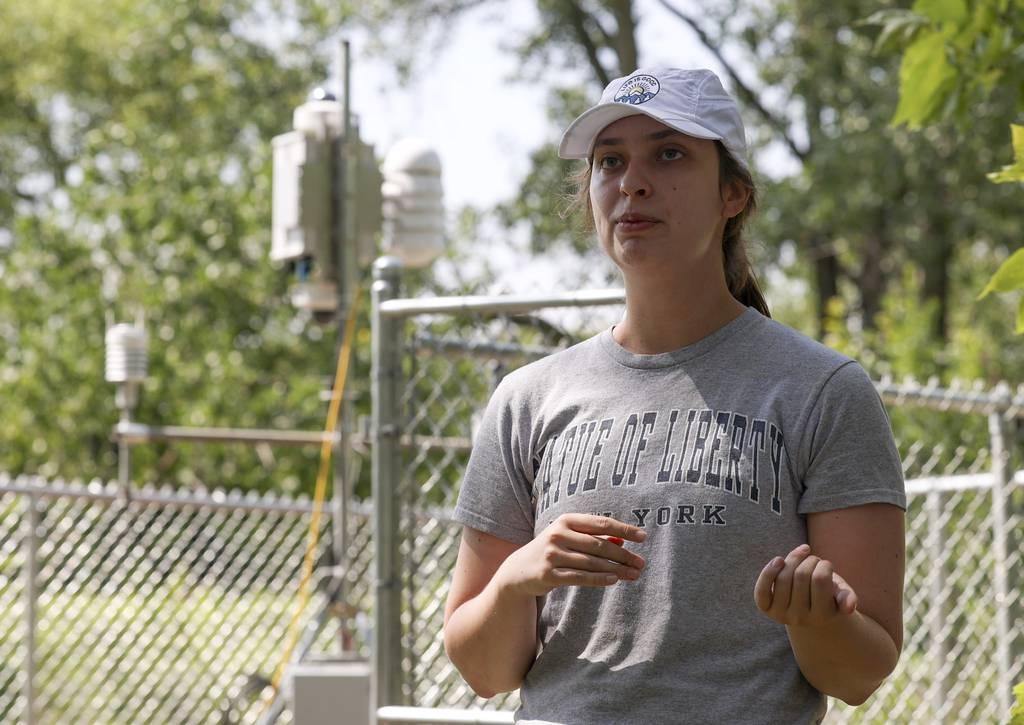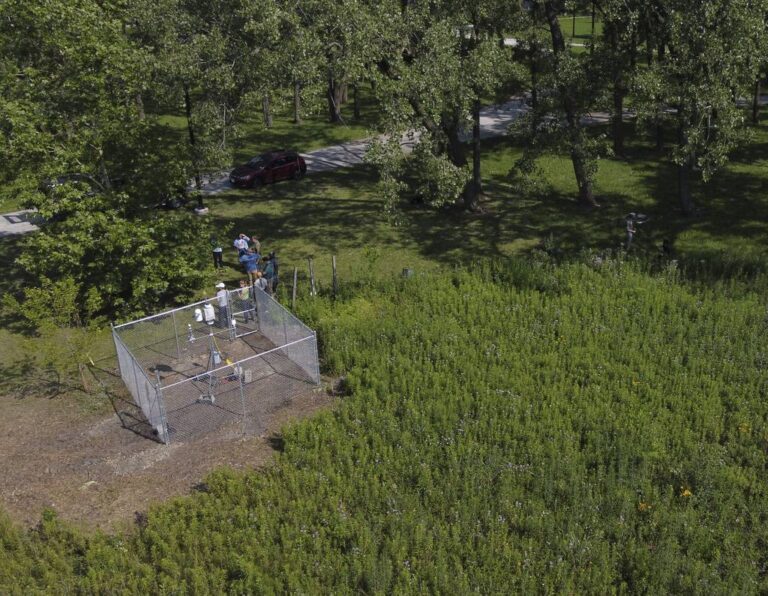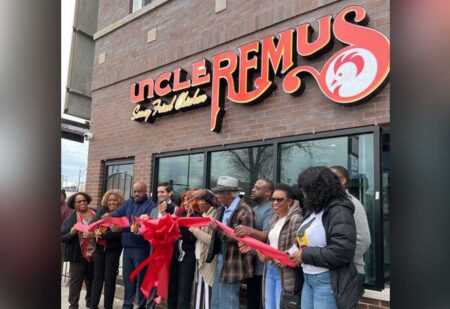Scientists from Chicago State University and Argonne National Laboratory launched a plan Tuesday to place 21 sensors across the city in the next five years that will allow them to study the effects of recent and future severe weather on historically under-resourced communities.
“Here’s the thing: We’re just getting started. No one’s done this before, so we don’t know what we’re going to see,” said Scott Collis, head of Geospatial Computing, Innovations and Sensing at Argonne.
Whatever the data shows, it will prove crucial in preparing for and responding to the threats of extreme weather. “We need data-driven policy decisions. How can we … make Chicago more resilient to climate change?” he said.
In the past month, Chicago’s skies have been filled with unhealthy air from wildfire smoke, and its streets and basements have been flooded because of torrential rains. The Midwest is often touted as a “climate haven,” but these extremes put Chicago among the ranks of other cities around the country and the world experiencing the devastating impacts of climate change
Tuesday kicked off the second sensor deployment this year led by Argonne’s urban laboratory called Community Research on Climate and Urban Science, or CROCUS. The first deployment was at Northeastern Illinois University. CSU is the southern end of the $25 million project’s node network.
The sensors measure data such as temperature, air quality, wind speed and direction, precipitation levels, soil drainage that will tell scientists exactly what is happening in the microclimates of Chicago’s most vulnerable neighborhoods — even down to city blocks — in real time. This, in turn, will allow researchers to create long-term models to predict changing weather patterns in the next few decades.
“Heterogeneity has got chunks. And I’ve got to say, the city of Chicago? It’s got chunks. Not everything is equal over there,” said Collis, in an attempt to explain how microclimates reflect a local set of atmospheric conditions in a given area that differ, either slightly or substantially, from the conditions in surrounding areas.
These microclimates — which are shaped by factors such as trees and green space, as well as the height and color of rooftops — interact with each other and with the climate in surrounding farmland, suburbs and Lake Michigan.
Scientists from 17 collaborating organizations gathered to have a first look Tuesday at the instruments placed at the edge of CSU’s prairie garden, a small oasis of fresh air, fluttering butterflies, tall grass and chirping birds.
Other sensors have been placed on the rooftop of the university’s science center and at the campus baseball field, which will likely yield different weather data based on the different characteristics and microclimates of each location.

“Chicago State University is honored to be a supersite for the CROCUS initiative, hosting three instruments collecting data from across our 161 acres,” said CSU President Zaldwaynaka “Z” Scott. “I’ve now been told that we have all kinds of ecosystems on our campus that can accommodate all kinds of research. By being part of this project, we will promote social equity, environmental justice and strengthen the community-scale resilience across urban landscapes.”
CSU is Illinois’ only predominantly Black institution, which means that students of color, as well as low-income and first-generation students, make up more than half of its student body. Scott emphasized the importance of CSU being part of the project and allowing its students hands-on scientific research experience.
“Working-class folks, Latino communities, Black communities in both these areas have strong ties to environmental justice due to persistently being overlooked,” said CSU alum and state Rep. Marcus Evans, of the 33rd District, referring to the South and Southeast sides of Chicago that he represents. “Where the research is happening and who conducts that research is equally important.”
That’s where the project’s community partners come in. One of them is the Greater Chatham Initiative, an organization seeking to revitalize the economy and quality of life in four South Side neighborhoods: Chatham, Auburn Gresham, Avalon Park and Greater Grand Crossing.

Afternoon Briefing
Weekdays
Chicago Tribune editors’ top story picks, delivered to your inbox each afternoon.
A lifelong Chatham resident, the initiative’s Executive Director Nedra Sims Fears lives 10 blocks from the university. Despite the fact that her community is not located in a flood plain, she has experienced firsthand some of the most extreme floods in the Chicagoland: “I don’t have one piece of childhood memorabilia because of the constant flooding,” she said.
“Flooding is not something that is mythical. It is real. It has negative consequences,” Sims Fears said, adding that her neighbors are never able to renovate and reconstruct because of the constant floods and thus have a lower quality of life. “We need real solutions. So it’s really great to work with Argonne and Chicago State to get it right the first time.”
Collis said Chatham does not get any more rainfall than other areas in the Chicagoland area such as Evanston or the city itself, but it floods all the time.
“And that’s the difference. Rain and storms is weather. Flooding is an impact,” he said. “Water does not stay where it falls; it is beholden to our engineered systems. So flooding — on top of the manmade disaster that is climate change — is another manmade disaster, one even more exacerbated by our engineered hydrology.”
The sensors will help scientists understand the ability of current infrastructures and systems to withstand climate change, for instance, how well existing surfaces and plants are able to absorb or channel rainwater. This will inform solutions to make communities like Chatham more climate resilient and to best protect families, neighbors, homes and businesses.
“How can we bring about a just energy transition? If we think of the future, if we think of what communities would like for their communities to be in 10 years or so, how can we make that accessible to everyone?” said Cristina Negri, director of the Environmental Science Division at Argonne. “How can we design solutions to the climate crisis that are really inclusive and pertinent to people’s needs?”







